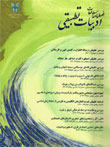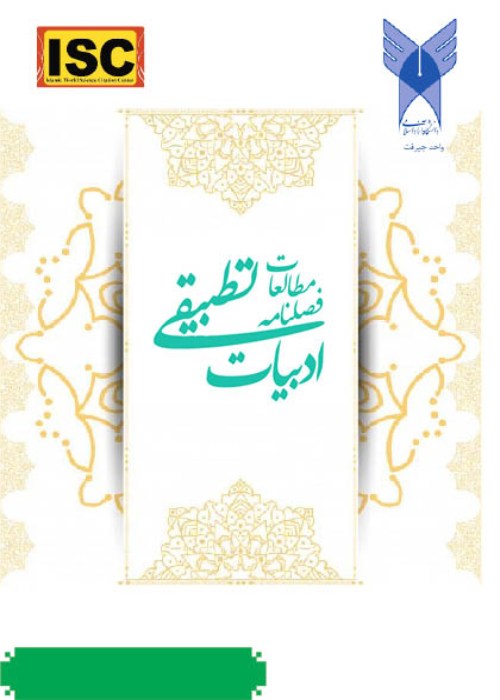فهرست مطالب

نشریه مطالعات ادبیات تطبیقی
پیاپی 31 (پاییز 1393)
- تاریخ انتشار: 1393/08/14
- تعداد عناوین: 6
-
-
صفحات 7-21هدف مقاله حاضر آن است که دو شاعر توانای فارسی و عربی یعنی عمعق بخارایی و متنبی را بعد از معرفی مختصر آن ها به صورت اجمالی با هم مقایسه کند. تنها اشعار مدحی ایشان مد نظر می باشد. در آن بین تاریخچه ای کوتاه از تاثیرات دو زبان فارسی و عربی بر هم و نظریه های اندیشمندان در آن باره ارائه می گردد. با وجودی که ادب عربی نزدیک ترین سنت ها را با ادب پارسی دارد و با همه تفاوت هایی که در تقسیمات زبان شناسی دارند، سرنوشت این دو زبان به هم گره خورده است، و تاثیر شگرفی بر یکدیگر داشته اند.
کلیدواژگان: عمعق بخارائی، متنبی، ادبیات عربی و فارسی، ادبیات تطبیقی -
صفحات 23-39هانری دو مونترلان یکی از نویسندگان قرن بیستم فرانسه است که منابع الهام خود را در متون کهن شرقی می جوید. وی بارها شیفتگی خود به سعدی را ابراز می کند و تحولات فکری و روحی خود را منطبق بر اندیشه این شاعر ایرانی جلوه می دهد. در آثار این دو نویسنده مضامین مشترک در خور توجهی به چشم می خورد که مهم ترین آن ها پرهیز از مطلق گرایی است. این اندیشه، ایشان را به تسامح در برابر عقاید گهگاه متضاد سوق می دهد. در مطالعه آموزه های اخلاقی ایشان نیز به نقاط اشتراک قابل توجهی برمی خوریم؛ چراکه هر دو، اخلاق را پدیده ای برآمده از خرد می دانند و غایت آن را در بهره گیری از مواهب زندگی می جویند.
کلیدواژگان: سعدی، مونترلان، شعر، پرهیز از مطلق گرایی، اخلاق، بهره گیری از زندگی -
صفحات 41-57مفهوم «زمان» بدون درنظرگرفتن معنای فلسفی آن به شکلی که هایدگر، سارتر، شوپنهاور، ویتگنشتاین و عده ای دیگر به آن نگریسته اند، شاید زیاد پرمایه و معنی دار نباشد اما معنای زمان بدون قراردادن در چارچوب فلسفی، می تواند به تنهایی نیز معنای عمیق و دل انگیزی داشته باشد. آیا امکان وجود زندگی بدون آنچه که ما را محدوده زمانی می نامیم وجود دارد؟ آیا اگر چارچوب های زمانی حال آینده و گذشته را کنار بگذاریم و یا اگر این ها را در ادبیات به هم بیامیزیم، به مرزها و مفاهیم جدیدی در نقد ادبیات و پی بردن به مشکل انسانی در تلاش برای فرار از مفهوم زمان خواهیم رسید؟ این مقاله در تلاش است که نظرات چند تن از نمایشنامه نویسان، شاعران و رمان نویسان مختلف غربی و ایرانی را در مورد اهمیت زمان بدون در نظر گرفتن مفهوم فلسفی (تسلسل در بحث) بررسی کند.
کلیدواژگان: ادبیات تطبیقی، زمان، ادبیات غرب، ادبیات ایران -
صفحات 59-71
طنز و طنزپردازی نزد اهل ادب و به خصوص شاعران یکی از روش های بیانی می باشد که با توجه به قدرت تاثیرگذاری فراوان بر ذهن خواننده، از دیرباز تا به امروز مورد توجه ادیبان بوده است. در میان شاخه های متنوع طنز، طنز سیاسی از کاربرد بیش تری برخوردار است، به طوری که شاعران بزرگ بسیاری از این هنر در سروده های خود بهره جسته اند. از میان شاعران معاصر ایرانی ملک الشعرای بهار و در شعر معاصر عربی، معروف الرصافی، با توجه به جایگاه ادبی و سیاسی ویژه ای که از آن برخوردار بودند، توانسته اند که در این زمینه هنرآفرینی نمایند. نویسندگان مقاله حاضر برآن اند با استفاده از روش توصیفی- تحلیلی ضمن بیان مفهوم طنز و انگیزه های طنزپردازی به بررسی تطبیقی طنز سیاسی در شعر دو شاعر بزرگ معاصر ایرانی و عرب بپردازند.
کلیدواژگان: طنزپردازی، شعر معاصر، سیاست، حکومت، استعمار -
صفحات 73-92
بررسی دو اثر در کنار هم، اغلب می تواند زمینه درک بیش تر آن ها را فراهم کند. به ویژه که از یک آبشخور باشند ولی متفاوت جلوه کنند. به نظر نویسنده دو اثر «بوف کور» (هدایت) و «ال الا»(سرانو) در عین بهره مندی از یک جلوه (نسبتا) مشترک، طوری به زاویه خویش می روند که گویی دو مقوله جدا از هم هستند! «بوف کور» بیش تر شرح آنچه گذشت است، ولی «ال الا» منجر به اتفاق و اتحاد روحی و معرفتی می شود. با یکی انفراد و افتراق، با یکی اتحاد و یکی شدن! پیچیدگی این آثار در وصف شخصیت ها و فضا باعث شد با نگاهی به اصل روایت با منطق مورد نظر گریماس پرداخته شود تا ضمن تشریح بیش تر روشن شود آیا در دل چنین آثاری(که مملو از تکرار و ابهام است) می توان به دنبال نظام خاصی بود؟ و اینکه وجود جلوه های مختلف یک فرد در عین تضاد چه اندازه می تواند به اتحاد و یکی شدن نزدیک شود؟
کلیدواژگان: بوف کور، ال الا، هدایت، سرانو، بینامتنیت -
صفحات 93-108
در این مقاله بنا داریم مشاهیر ایران در ابیات عرب را معرفی کنیم. برای این مهم به بررسی ادوار تاریخ ادبیات پرداختیم و روشن شد که سهم ایرانیان در تبلور ادبیات عربی چشمگیر است. اسلام با ورود به ایران طرفدارانی پیدا کرد، و اختلاط اعراب با ایرانیان باعث شد تا فرهنگ دو کشور بر یکدیگر تاثیر بگذارد. این تاثیر در دوره اموی کم رنگ تر است چون حکومت اموی همواره نژاد عرب را بر غیر عرب به خصوص ایرانیان ترجیح می داد و همین باعث شد که ایرانیان کم تر در این دوره وارد حوزه ادبی شوند. ولی اختلاط شدید و رفعت مقام ایرانیان در دوره عباسی در ظهور چهره های مذهبی، ادبی و علمی سهم شایسته ای دارد. در این مقاله با برخی مشاهیر که بیش تر چهره های ادبی هستند آشنا می شویم و با نگاهی تطبیقی به بررسی آثار آن ها می پردازیم.
کلیدواژگان: اعراب، ایرانیان، شعرا، اموی، عباسی، ادبیات عرب
-
Pages 7-21The purpose of this paper is to introduce the Amaq Bukharai and Motanabbi two poet of Persian and Arabic and then making a brief Comparison between them. Which his eulogy poetry is considerable. In the short history of Persian and Arabic influence on thinkers and theories about it offered. Although the Arabic literary tradition closest to Persian literature, and with all the differences in linguistic divisions are tied to the fate of these languages. And have a big impact on each other.Keywords: amaq, Bukhari, Motanabbi, Arabic, Persian literature, Comparative literature
-
Pages 23-39Montherlant, writer in France, quests his inspiration resources in eastern texts. He shows his adoration to Saʼdi and indicates his mental and spiritual evolutions according to his. There are so many common themes in these two authors the most significant of whose is eschewing absolutism. Besides, we confront other common points while studying their moral teachings. That¢s because of their mutual conception of morality as a wisdom-originated phenomenon and observing its goal in applying blessings of life.Keywords: Saʼdi, Montherlant, poetry, Avoiding, Absolutism, Morality, Gratification of life
-
Pages 41-57May be it is not so meaningful disregarding philosophical meanings and concepts of time as Heidegger, Sartre, Schopenhauer and some others considered, but its concepts can meaningful and attractive without its philosophical frame. Is it possible to live without considering what is called limitation of Time? If we put aside the time frames (past, present and future) or we combine then in literature, can we achieve new areas and concepts in literary criticism and new understanding in Man’s attempt to get rid of the concept of the time? This article tries to study the several different Iranian and western playwrights, poets’ and novelists’ ideas about the time without considering its philosophical ground.Keywords: Comparative literature, Time, Western literature, Persian
-
Pages 59-71
Satire is one of expressional ways used by literary men particularly poets. This medium of expression has been the center of attention of literary men over ages up to date. and it has been reflected in their worles in different ways with respect to the purpose it has been used. Of all varieties of satire, political satire has been utilized more in the works of cotemporary literary men so that many a great poets have benefited from this art in their poetry. Of Iranian poets, Malek Alshoara Bahar and of the Arab contemporary poets, the famous poet, Alrosafi, considering their literary and political positions, could play a great artistic role in this respect.
Keywords: political satire, Malek Alshoara Bahar, Alrosafi, poetry -
Pages 73-92
Investigating two effects can often provide two understand it more, especially when they are from one source but day seem different. In writers idea two effects boof koor (hedayat) and elella (Serrano) while they benefit from one manifestation but they seem two separate categories. Both of them are discussed in the mental or psychological sense and try to report a new emotion and analyses it and become familiar with different people in fact they reach to themselves or show themselves in boof koor more explanation is what is happen but in elella it leads two a consensus and unity with mental and cognitive events and complexity of them or united to describe personalities caused by looking at the origin narrative with the Grymas logic to be explained more clearly. Inside such works (which is full of repetition and ambiguity) can find a particular system and different manifestation of one person how can be closed to be united while they are in contrast.
Keywords: ellella, hedayat, serano, intertextuality -
Pages 93-108
Here I want to introduce Iranian celebrities in Arabic literatures. In order to achieve this purpose, I study periods of literature history and finally it was found that Iranian contribution in formation of Arabic literature was impressive. By entrance of Islam to Iran, many followers turned to it. And the association of Arabs and Iranian people caused the mutual influence on both countries culture. This influence is less visible in Umayyad caliphate. Because Umayyad caliphate, prefer Arabs to non-Arabs especially Iranian people. And this preference causes less contribution of Iranian in literature domain in that period. This humiliation finally led to down fall of Umayyad. After revolution of Abu-Muslim Khorasani, the ground for Umayyad downfall and formation of Abbasid caliphate was provided. Abbasid begin their insurrection by accepting Ahl-Al-Bayt and enjoy the total support of Iranian. This matter had beneficial consequences for Iranian; they gain important positions in Abbasid caliphate. This high contribution and elation in their position had a great effect on emergence of religious, literary and scientific faces. In this study we will be familiar with some of these celebrities which most of them are literary people.
Keywords: Arab, Iranians, poets, umayyad, abbasian, Arabs literature


